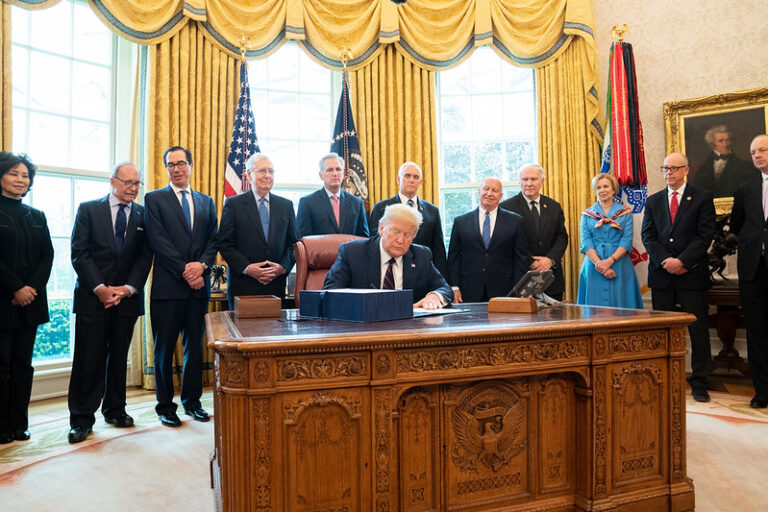The Senate passed the $2 trillion Coronavirus Aid, Relief, and Economic Security, or CARES Act, on March 25 by a vote of 96 to zero. The House of Representatives then passed the act on March 27 by voice vote before it headed to President Trump’s desk, who signed the act almost immediately.
Sen. Richard Shelby, R-Ala., noted in a statement that 80% of the total funding provided in CARES Act is going directly to state and local governments.
“I am confident that this legislation will pave the way for us to overcome the current economic and public health crisis we are facing, allowing us to emerge stronger on the other side,” he said.
Analysis of the emergency funding measure conducted by the American Association of the State Highway and Transportation Officials indicates the U.S. Department of Transportation will receive $31.1 billion in funds to disburse in several directions:
- The Federal Transit Administration (FTA) will receive $25 billion for transit providers, including states and local governments across the country, for operating and capital expenses. Funding will be distributed using existing FTA formulas, with an estimated $1.8 billion for rural systems funded under Section 5311.
- Amtrak will receive $1.018 billion for operating assistance to cover revenue losses related to the novel coronavirus. No less than $239 million is provided for state-supported services, with the provision that states are not required to pay more than 80% of fiscal year 2019 costs.
- The Federal Aviation Administration gets $10 billion for its Airport Improvement Program, distributed by formula, to maintain operations at airports across the nation that are facing a record drop in passengers.
- Legislative language directs the Federal Highway Administration to clarify that states can issue special permits for overweight vehicles and loads to allow for the free flow of critical relief supplies during the current COVID-19 epidemic for the duration of the current fiscal year.
- The Essential Air Service gets $56 million to maintain existing air service to rural communities; monies necessary to offset the reduction in overflight fees that help pay for the EAS program.
In addition to those USDOT provisions, $32 billion in grants are provided for aviation sector businesses outside the appropriations process, and up to $46 billion in loans and loan guarantees are provided for aviation sector businesses, according to AASHTO’s analysis.
In a statement released March 27, the American Trucking Associations praised Congress and President Trump for passing the bill into law, saying the legislation provides critical assistance needed by motor carriers to maintain payrolls, the economy’s supply lines and the movement of essential goods.
“Across the country right now, truckers are answering the call during this national emergency, delivering food, medicine, PPE and other critical supplies. It’s important for our nation’s supply chain that trucking has access to liquidity so we can keep our trucks on the road — and not on the sales lot,” said Chris Spear, ATA president and CEO.
“Truckers don’t have the option to telework, and they’re not asking for a handout,” Spear continued. “But they are asking for liquidity and the necessary bridge to keep trucks moving as America recovers from this crisis.”
The legislation provides $377 billion to help prevent workers from losing their jobs and small businesses from going under due to economic losses caused by COVID-19. The Paycheck Protection Program provides eight weeks of cash-flow assistance through 100% federally guaranteed loans to small employers who maintain their payroll during this emergency. It also expands eligibility for entities suffering economic harm due to COVID-19 to access the Small Business Administration’s (SBA) Economic Injury Disaster Loans (EIDL), while also giving SBA more flexibility to process and disperse small dollar loans. It requires SBA to pay all principal, interest, and fees on all existing SBA loan products for a period of up to six months.
“We thank President Trump and leaders in Congress for putting partisan differences aside and taking these necessary steps to keep our economy moving. The trucking industry will continue to do our part to move America through this challenge,” Spear said.
The Trucker News Staff produces engaging content for not only TheTrucker.com, but also The Trucker Newspaper, which has been serving the trucking industry for more than 30 years. With a focus on drivers, the Trucker News Staff aims to provide relevant, objective content pertaining to the trucking segment of the transportation industry. The Trucker News Staff is based in Little Rock, Arkansas.








